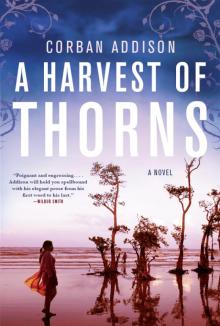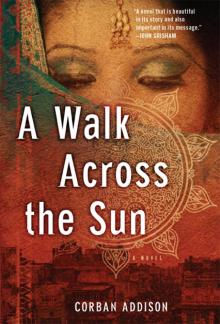- Home
- Corban Addison
The Garden of Burning Sand
The Garden of Burning Sand Read online
THE
GARDEN
OF
BURNING
SAND
CORBAN
ADDISON
Dedication
For the children of Africa
who meet suffering with song.
And for people of goodwill in every land
who have not forgotten them.
Epigraph
A person is a person through other persons.
—Desmond Tutu
The burning sand shall become a pool.
—Isaiah the Prophet
Table of Contents
Cover
Title Page
Dedication
Epigraph
PROLOGUE
An African Night
A Hearing in the Senate
PART ONE
Chapter 1
Chapter 2
Chapter 3
Chapter 4
Chapter 5
Chapter 6
Chapter 7
Chapter 8
PART TWO
Bella
Chapter 9
Chapter 10
Chapter 11
Chapter 12
Chapter 13
Chapter 14
Chapter 15
PART THREE
Bella
Chapter 16
Chapter 17
Chapter 18
Chapter 19
Chapter 20
Chapter 21
Chapter 22
PART FOUR
Darious
Chapter 23
Chapter 24
Chapter 25
Chapter 26
Chapter 27
Chapter 28
PART FIVE
Darious
Chapter 29
Chapter 30
Chapter 31
Chapter 32
Chapter 33
Chapter 34
Acknowledgments
About the Author
Author’s Note
Also by Corban Addison
Copyright
About the Publisher
PROLOGUE
I am the end of the tunnel lost in my beginning.
—Dambudzo Marechera
An African Night
Lusaka, Zambia
August, 2011
The girl walked alone on the darkened street. Lights moved around her as cars drove by, their headlights shining on the dusty roadway, but no one seemed to notice her or care that she was alone. Her gait was steady, but her steps were irregular, for one of her legs was shorter than the other. She was wearing a thin dress that offered little protection against the late winter chill. She felt the cold on her skin, but it concerned her less than the empty flat she had left.
She looked back at the building where she lived. Lights were on in the windows. She could hear the blare of televisions over the sounds of traffic. She held her doll by the arm and stared at Auntie’s flat through the thick lenses of her eyeglasses. She didn’t understand where Bright and Giftie had gone or why they had left her by herself. She didn’t understand why they had forgotten to close the door.
She turned back to the road and started off again, swinging her doll like a metronome. She heard music in the distance, and for a moment it distracted her. Then she saw a group of young people across the road. They were smoking cigarettes and talking loudly. Remembering Bright and Giftie, she took a step toward the tarmac, wondering if the smokers knew where they went. But a horn blast from a passing car stopped her in her tracks.
She clutched her doll to her chest and glanced around again, rocking ever so slightly on her feet. Everything looked strange in the dark. Sometimes Giftie took her to another building to play, but she couldn’t remember which way it was. The street didn’t appear the way she remembered. She began to cry. She wanted the sun to rise and the strangeness of everything to go away. The night made her afraid. People lost their kindness when darkness fell.
The girl saw him then—a boy playing with a ball in an alley. She focused on the boy and started walking again. Bright and Giftie had many friends. Perhaps the boy was one of them. She strolled along a wall rimmed with razor wire, her feet scuffing the dirt. As she approached the alley, she heard a popping sound, like fritas frying in a pan. She glanced over her shoulder and saw a truck pull up behind her, its tires grinding the earth. The truck stopped beside the wall and its lights pierced her eyes. She turned away and looked for the boy with the ball. He was gone.
The girl entered the alley and listened to the boy’s voice echoing off the walls around her. She heard another voice—a woman’s voice—rise above it, sounding cross. The girl caught a glimpse of the boy running. Seconds later he disappeared and the woman’s lecture stopped. The girl walked deeper into the shadows, holding her doll and searching for a break in the wall—whatever the boy had passed through. She stumbled on a pile of rocks and tears gathered in her eyes. Even the ground was unfriendly at night.
She looked at the buildings beyond the walls. They were tall, like the building where she lived, but they were strange. The fear came upon her in a rush, and she decided to go back to the flat. Auntie would return soon, and Bright and Giftie would come home.
She was about to turn around when she heard the popping sound again. At once, light filled the alley. Then just as quickly darkness descended. The girl looked toward the street and saw the truck that had stopped beside the wall. It was driving slowly up the alley, its headlights off. A man got out of the truck and stared at her. There was something in the shape of the man’s face that made her comfortable and uncomfortable at the same time.
The man knelt down and held out his hand. She saw a sweet in his palm. Her mother had given her sweets whenever she had asked her to sleep in the bathroom. After a moment, the girl reached out and put the sweet in her mouth. She smiled at the man, deciding he must be a friend.
What happened next made no sense to her. She had no idea why her legs grew weak and her fingers lost hold of her doll, why the night spun out of control and pain shot through her head. Her eyelids drooped, then opened again. She saw the shadow of the man hovering over her. He bent down and lifted her off the ground. She had lost her glasses, but his face was close as he carried her and she saw his eyes. They were large and round, like a cat’s. Her mother had told her stories about cats—the cats that lived wild in Africa.
She heard a click like a door latch and felt the man’s hands push her into a cramped space blacker than the sky. Her last impression was the rumble that began beneath her and grew louder until the world fell away and the night itself vanished in darkness.
A Hearing in the Senate
Washington, D.C.
May, 2012
The lights above the dais were blinding to Zoe, a string of miniature suns staring back at her, exposing every imperfection in her face—her slightly offset ears, the mole at the crest of her left eyebrow, the freckles that dotted the fair skin around her nose—and reaching deeper still, as if to make public her thoughts. Having watched her father on the campaign trail first in his race for the Senate twelve years ago and now in his quest for the White House, Zoe knew that all politics were theater and that privacy had no place on the stage.
She closed her eyes against the glare and pictured her mother’s face—the way her smile had dimpled her cheeks and wrinkled the skin around her eyelids, the look of earnestness and secret pleasure that had turned skeptics into supporters across the globe. Catherine Sorenson-Fleming had been irresistible in life, a force of indefatigable optimism about the world that could be—a world in which the poor were not an afterthought. Africa was her great love affair, and she had passed it on to Zoe. It might as well have been writte
n into her will as a bequest.
How would you have handled this, Mom? Zoe thought, wrestling with the dilemma before her. She remembered something her mother used to say: “Speak the truth, consequences be damned.” But that didn’t resolve the question. The truth was only part of the story.
Zoe opened her eyes and regarded Senator Paul Hartman, Chairman of the Foreign Relations Committee, who had taken his seat at the head of the dais beneath the great seal of the United States. Around him in the wood-paneled chamber aides scurried, brandishing sheaves of paper. Hartman placed a binder in front of him and glanced around the room until his eyes settled on Zoe. He smiled slightly, as if sharing an inside joke, and Zoe felt the ice inside her begin to crack. His kindness deepened her dilemma. He had no idea of the secret she carried, or the anger.
Senator Hartman was the reason she was here. He had read her article in the New Yorker and issued the invitation. She had been intrigued and skeptical at the same time.
“Is my father aware of this?” she had asked when they had first spoken on the phone.
“I haven’t shared my thoughts with him, no,” Hartman replied.
“What are the chances he’ll come to the hearing?”
“With the election so close, I’m not sure. But your presence could shift the balance.”
“In other words, the hearing is for show,” she said, testing his motives. “A political ploy in support of the President less than two months before the polls open.”
Hartman hesitated. “Was your article for show?”
The question caught her off guard. “I wrote it because it needed to be said.”
“Call me old-fashioned,” Hartman said, “but I feel the same way. As you put it, generosity itself is on the gallows.”
“And you think a Senate hearing will make a difference?”
“The public loves a good controversy. Whether you meant to or not, you created one. If we take advantage of it, people might actually learn something.”
It’s a gamble, Zoe thought, but it might just work—for him and for me.
“I’ve talked to Frieda Caraway,” he went on.
“Is she on your witness list?” Zoe asked. Caraway was an actress on Hollywood’s A-list and something of a legend in humanitarian circles. AIDS, trafficking, conflict minerals, Free Tibet, her causes were as numerous as her screen credits, yet only the most cynical questioned her intentions. Her grandparents had died at Auschwitz.
“Not yet,” Hartman said, “but I’m working on it.”
The Senator’s words had thrilled and terrified Zoe. The opportunity was too enticing to decline. “You get Frieda on a panel with a couple of experts from the development community, and I’ll be there.”
Hartman had chuckled as he hung up the phone. A week later he called her back with good news and a hearing date. He also passed along Frieda Caraway’s email address.
“She read your article, too,” he told her. “She can’t wait to meet you.”
“The nonprofit lawyer from Zambia or Jack Fleming’s daughter?”
Hartman laughed. “You have your mother’s tongue. She wants to meet the Zoe Fleming who took on the African justice system and changed the life of a girl with Down syndrome.”
Five weeks later, Zoe had boarded the South African flight from Johannesburg to Washington, D.C. It was the first time she had returned to the United States in three years.
A chorus of voices outside the hearing room made Zoe turn her head. As spectators gawked and cameramen angled for a shot, Frieda Caraway made her entrance, her security detail in tow. Like Zoe, the actress was dressed in a conservative pantsuit and an open-collared blouse, but Hollywood glittered in her diamonds—at least ten carats between her earrings and the pendant on her necklace.
Zoe stood as she walked to the witness table. Frieda’s almond brown eyes lit up. “My dear Zoe, such a joy to finally meet you.”
Although they had exchanged emails and spoken once over Skype, Zoe was unprepared for the hug that followed Frieda’s greeting.
“Looks like the sharks have gathered,” Frieda whispered. “Are you ready for this?”
Zoe watched the cameramen take their positions in the space between the dais and the witness table. Behind them Senators shuffled papers importantly, but their eyes strayed toward the actress, revealing their true interest. Only one seat had yet to be filled—her father’s.
“It’s a bit of a circus,” Zoe replied, trying to affect a nonchalance she didn’t feel.
“Ignore it,” Frieda replied. “The only thing that matters is what we’re here to talk about.”
Zoe took her seat again as Frieda shook hands with the other witnesses at the table: Bob Tiller, computer mogul, philanthropist, and masthead of the largest foundation in the world; and Susan Moore, chairwoman of the Organization for International Development, a global NGO. It was a star-studded panel. In a presidential election year, Hartman had pulled off a coup.
Zoe looked down at her notes, then back at her father’s chair. She checked her watch. It was four minutes past two o’clock: the scheduled start-time for the hearing. If he didn’t show up, the dilemma would resolve itself and the truth that had defined her life since she was seventeen would stay buried. She felt a sudden sense of relief. At moments she had convinced herself that the truth needed to come out. Yet the prospect of actually speaking it filled her with unease.
She glanced at her older brother, Trevor, sitting in the reserved seats. He nodded at her, a vision of ambivalence. She turned back to the dais and felt the guilt churning in her stomach. Trevor was one of her favorite people in the world and, until recently, the only man whose motives she trusted implicitly. Only a year apart in age, they understood each other as no one else did. In the years when they were raised by nannies—Jack off conquering Wall Street and Catherine gallivanting across the globe—Trevor had been her shelter. But he didn’t know about the ghost that lived at the Vineyard house. He had left for Harvard, and she had never told him.
Zoe focused on Senator Hartman as he rapped his gavel, bringing the hearing to order. Suddenly, a door opened in the paneling behind him and Jack Fleming appeared, flanked by senior aides. Zoe took a sharp breath, barely conscious of the buzz rippling through the gallery or the cameras swiveling to capture an image of the candidate, fresh off the stump in Ohio. She hadn’t seen her father in eight months. He looked older now, his hair grayer, his face fleshier, and his trademark pinstripe suit too tight around the midsection. He had always prided himself on his fitness, but the endless campaigning seemed to have weathered him.
He leaned down and whispered something into Hartman’s ear—an apology, Zoe guessed—then took a seat on the left side of the dais without so much as a pad of paper in front of him. In spite of herself, Zoe almost smiled. When she and Trevor were children, he had sometimes allowed them to attend board meetings at Fleming Randall, the investment firm he had built into a Wall Street giant. Though they had been excluded from anything confidential, she had seen enough to understand the reasons for her father’s success. Along with a dynamo personality and unshakable self-confidence, he had a photographic memory.
“Many thanks to Senator Fleming for his attendance,” Hartman began, silencing the spectators. “I know his schedule is demanding. We have a distinguished panel to hear from, but before we give them the floor I’d like to say a few words about what brings us together today.”
He looked at Zoe, then at Frieda, and commenced his remarks. “In the midst of the Great Depression, Franklin Delano Roosevelt articulated a vision of American society that has defined us for generations. ‘The test of our progress,’ he said, ‘is not whether we add more to the abundance of those who have much; it is whether we provide enough for those who have too little.’ Now, in the midst of what some have called the Great Recession, that vision is in peril.”
Zoe listened as Hartman recited an argument she knew by heart. She kept her eyes fixed on his face, willing herself not to meet her father’
s eyes. She heard Trevor’s voice over breakfast that morning: “He loves you, Zoe. Do you really want to hurt him?” It was a question she didn’t know how to answer. Their estrangement was a knot that seemed impossible to untangle. For what he did, she had never forgiven him. But he had never asked.
At some point, she raised her eyes to the seal behind Hartman’s head, etched in relief upon the polished blond wood. “E Pluribus Unum,” her mother had been fond of saying. “A motto for the world, not a nation alone.” She thought of Kuyeya lying on the hospital table in Zambia, crying, and Dr. Chulu, at once grim and enraged, examining her. Suddenly Zoe’s suffering seemed small, even petty, in the shadow of an evil so much greater.
She decided then that Jack Fleming deserved to be defeated. Not because he had betrayed her or because he was unfit to be Chief Executive—in many ways he was born for the Oval Office—but because in the name of fiscal austerity he would abandon children like Kuyeya. That was why Senator Hartman wanted her father in the chair, why he had brought her in from Africa to tell her story. It wasn’t about partisanship or election-year politics. It was about conscience.
At last she looked at her father and touched the ring on her finger, the ring the Somalis had salvaged from the wreckage of her mother’s plane. You know what I’m thinking, don’t you? August 19, 2000. I know you remember.

 A Harvest of Thorns
A Harvest of Thorns The Garden of Burning Sand
The Garden of Burning Sand A Walk Across the Sun
A Walk Across the Sun